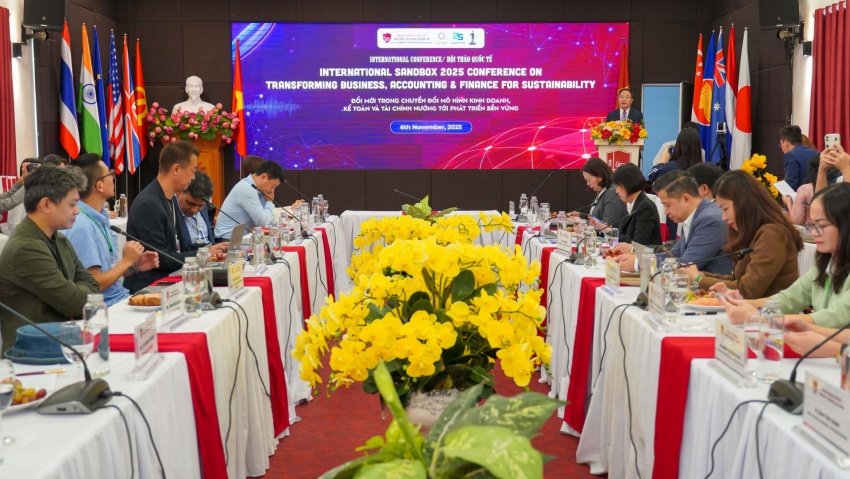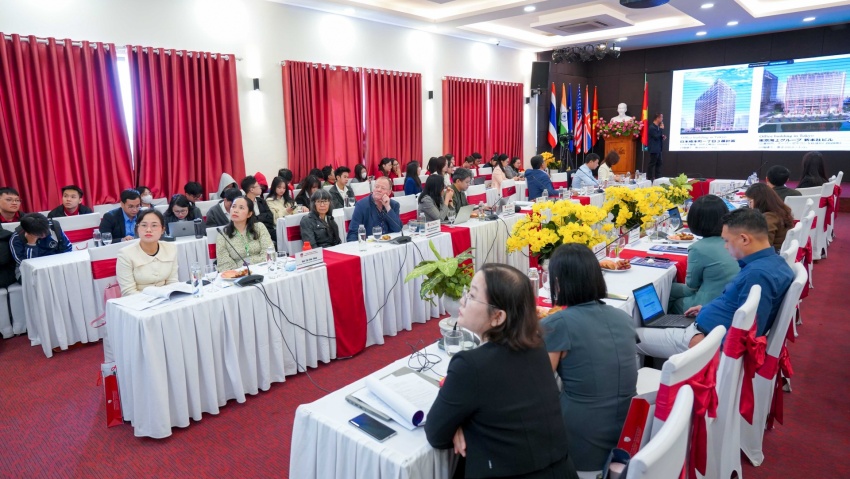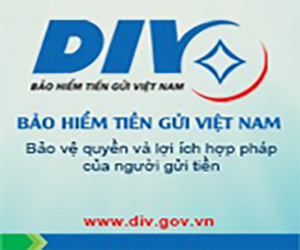The international Sandbox 2025 Conference on transforming business, accounting, and finance for sustainability was held on November 6 at Vietnam National University's University of Economics and Business (VNU-UEB). It aimed to provide a solid academic foundation for managers, scholars, and experts while supporting businesses in transforming their models to address environmental and social challenges.
 |
| international Sandbox 2025 Conference on transforming business, accounting, and finance for sustainability held by VNU-UEB |
The world is undergoing a dual transformation, driven by the explosion of digital technology, especially AI, and the global demand for sustainability. While AI opens new opportunities for operational efficiency, climate change and social responsibility call for a rethink of governance and business models.
In his opening remarks, Le Trung Thanh, rector of the VNU-UEB, emphasised the collective response to the ongoing dual transition: the rapid digital transformation driven by AI and the global imperative of sustainable development. "Together, these forces are redefining the future of management, economics, and governance, calling for a rethinking of how accounting and finance can act as engines of sustainable change," he said.
The event highlighted the university’s commitment to advancing knowledge and innovation for sustainable development. Nazim Hussain from the University of Groningen, the Netherlands, analysed the gap between corporate social responsibility (CSR) disclosures and actual CSR practices, known as “CSR decoupling”. His study examined how gender diversity on corporate boards can help mitigate this phenomenon.
Based on a dataset covering global companies from 2002-2017, the findings noted that a higher proportion of women (not merely symbolic representation) on boards enhances monitoring quality. Firms with more female board members, especially independent ones, show lower CSR decoupling. Moreover, gender-balanced boards (neither male- nor female-dominated) are most effective in ensuring the authenticity of CSR reporting.
"Gender diversity fosters transparency and ethical governance. Companies are encouraged to move beyond tokenism by empowering women in leadership roles, thereby strengthening stakeholder trust and long-term sustainability," he said. The study also calls for future research using longitudinal and qualitative data to better understand genuine CSR integration in corporate governance.
Toshihiro Yamada, co-founder and design director of Haru4 (Japan), shared Japan’s initiatives linking forests, timber technology, and sustainable urban development. His projects promote metropolitan timber architecture and green market innovation, with plans to expand these models to Vietnam. These represent key trends in embedding sustainability into business model transformation through design.
Japan’s rich forest resources have long been underutilised. Today, technological advancements enable the construction of large-scale wooden structures meeting modern fire and earthquake safety standards. Yamada identified four key factors for a thriving green market: sustainable supply and harvesting; supportive policies and regulations, notably the 2000 Act permitting high-rise wooden buildings; market standardisation and technological innovation (engineered wood, hybrid structures, modular construction); and education and collaboration through “MOKUIKU” wood education and community programmes.
"Using wood in architecture not only enhances mental wellbeing, creativity, and social connection but also contributes to a circular “cut-use-replant” economy. Timber architecture sequesters carbon, protects the environment, and promotes sustainable urbanisation. Japan’s timber model offers valuable lessons for Vietnam’s green construction sector," he said. "Collaboration among architects, policymakers, and academics is key to transforming forest resources into lasting economic and cultural value."
 |
Kanitsorn Terdpaopong from Rangsit University (Thailand) presented a regional ASEAN study examining how perceptions of AI, personal attitudes, and family influence shape accounting students’ career intentions amid automation and digital transformation.
Surveying 991 accounting students across Indonesia, Malaysia, Thailand, and Vietnam, the research found that attitude and family influence are the strongest predictors of career intention. Perceived ease of AI use positively affects attitudes, while concerns about AI’s negative impact reduce motivation. Family support strongly influences both attitudes and career choices.
"Accounting education, therefore, must shift focus from technical execution to strategic, analytical, and ethical competencies. Universities should emphasise AI governance, critical thinking, and lifelong learning, while professional associations must evolve from preserving tradition to leading digital transformation, helping future accountants become trustworthy AI managers and supervisors," he suggested.
Nguyen Huy Tam from VNU-UEB traced the evolution of accounting from ancient bookkeeping to sustainability-oriented integrated reporting, highlighting the importance of combining financial and non-financial information to ensure long-term corporate accountability.
Modern accounting no longer centres solely on profit but also reflects environmental and social impacts. Key frameworks discussed include the International Finance Corporation environmental, social, and governance (ESG) guidelines, integrated reporting, and ESG performance indicators. Case studies featured Volkswagen’s emissions scandal (transparency), BP’s oil spill (environmental risk accountability), and Tesco’s reports (2003-2023), illustrating the shift from shareholder profit to stakeholder value.
"Today’s accountants play a crucial role in measuring, verifying, and reporting sustainability metrics. The research calls for further studies on AI applications in ESG reporting, small- and medium-sized enterprise sustainability, and emerging economies. The accountants of the future will not only safeguard financial integrity but also protect the planet’s health," Tam declared.
The international conference served as a platform for sharing expertise, shaping new concepts of sustainable management, and responding to trends such as AI, green markets, and sustainable architecture. The event gathered scholars and researchers from Vietnam and abroad, introducing new research directions in accounting, finance, risk management, and sustainable value measurement, contributing to knowledge advancement and corporate sustainability transformation.


















































